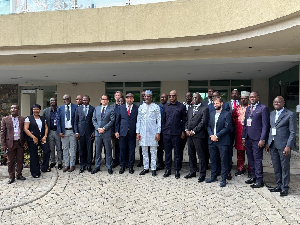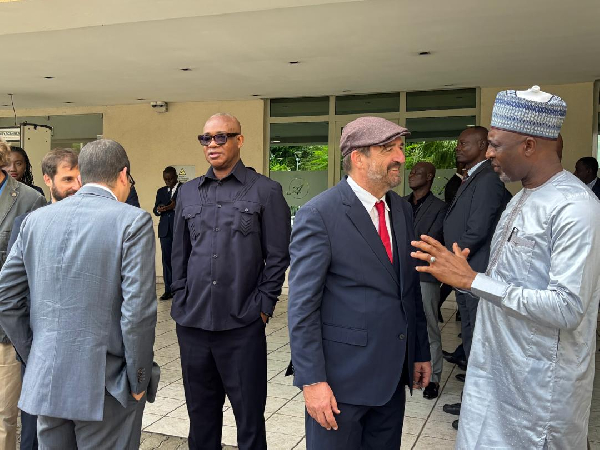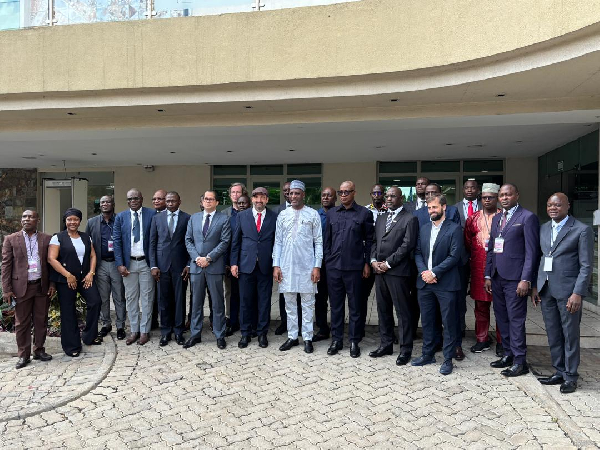 Some of the stakeholders who attended the programme
Some of the stakeholders who attended the programme
Key stakeholders from across West Africa have convened in Accra for the Regional Planning Meeting for Operation KAFO VI, a critical multilateral initiative aimed at combating the illicit trafficking of firearms across borders.
The meeting, held from May 27 to 29, 2025, brings together representatives from Benin, Burkina Faso, Ghana, Mali, and Togo, with support from the United Nations Office on Drugs and Crime (UNODC) and financial backing from the Federal Republic of Germany.
Speaking during the opening session on May 27, 2025, Ghana’s Minister of the Interior, Muntaka Mohamed Muntaka-Mubarak, stressed the urgency of regional collaboration in confronting the proliferation of small arms and light weapons (SALW), which he described as both a “symptom and catalyst of instability” in the sub-region.
“This meeting is not simply a planning session. It is a call to action—a declaration that we will not sit idly by while our communities are put at risk,” the Minister stated.
He noted the devastating consequences of illicit weapons, citing increased terrorist activities and violent crime in both urban and rural communities.
The Minister called for the integration of strategic prevention mechanisms, stronger intelligence sharing, and inclusive operations—particularly encouraging gender balance in enforcement teams.
Dr. Adam Bonaa, Acting Executive Secretary of the National Commission on Small Arms and Light Weapons (NACSA), reiterated Ghana’s commitment to regional peace and security.
He highlighted the importance of sustained institutional capacity building, community engagement, and legislative reforms.
Dr. Bonaa also emphasized the need for the swift passage of Ghana’s proposed Arms Bill, a legislative instrument designed to modernize national firearms regulations and align them with international standards such as the ECOWAS Convention and the UN Firearms Protocol.
“We must ensure that our legal frameworks keep pace with the evolving nature of transnational crime,” he urged.
Speaking on behalf of UNODC, Christoph Capelle, Acting Head of the UNODC Office in Ghana, highlighted the strategic importance of the meeting.
He revealed that Ghana recently concluded its first national strategy against organized crime (2025–2030), developed in collaboration with the Ministry of Justice and the Ministry of the Interior, with support from UNODC. The strategy specifically addresses the reduction of illicit weapons.
“The trafficking of firearms is not just a matter of crime—it is a matter of life and death,” said Capelle.
He emphasized that the only way to combat such a transnational threat is through equally transnational, unified, and strategic responses.
Also present was Leonardo Lara, Team Leader of the UNODC Firearms Trafficking Section, who described Operation KAFO as a “strong and growing alliance” against the flow of illicit arms fueling conflict, crime, and terrorism.
He noted the complex and adaptive nature of trafficking networks, warning that they continue to exploit porous borders and jurisdictional loopholes across the Sahel and coastal states.
German Ambassador to Ghana, Daniel Krull, underscored Germany’s long-standing commitment to fighting organized crime in West Africa.
He praised UNODC’s practitioner-focused approach and urged participating countries to maintain strong collaboration.
“The elephant in the room is not easy to get rid of… only when countries are committed to working together will we have a good chance of mitigating the challenge,” he said.
Over the course of the three-day meeting, national delegations are expected to present threat assessments, identify high-risk border areas, and finalize operational plans for KAFO VI.
Training modules, enforcement tools, and coordination mechanisms are also on the agenda.

AM/KA
